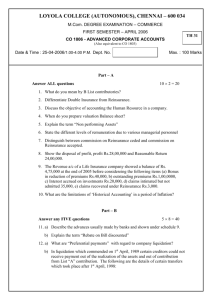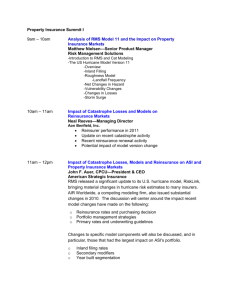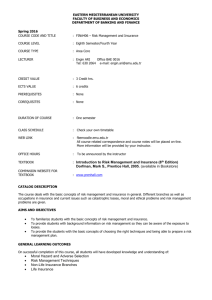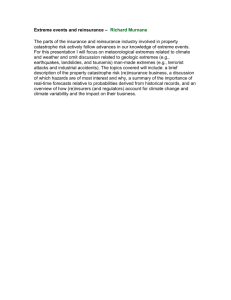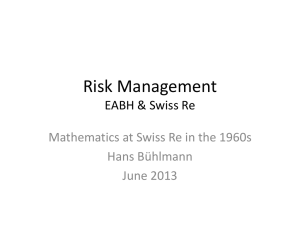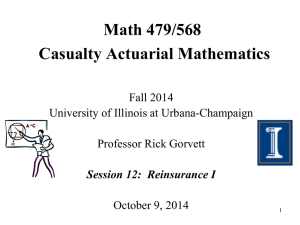Changes to SSAP #62 Property and Casualty Reinsurance
advertisement
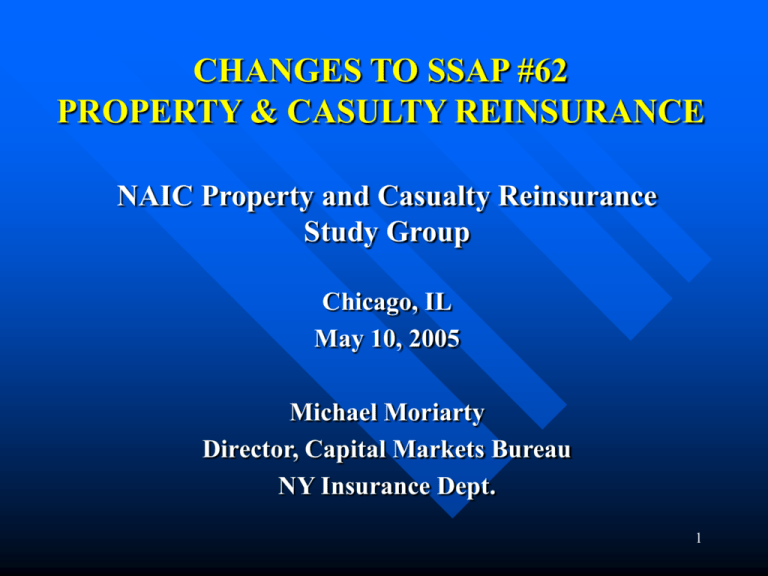
CHANGES TO SSAP #62 PROPERTY & CASULTY REINSURANCE NAIC Property and Casualty Reinsurance Study Group Chicago, IL May 10, 2005 Michael Moriarty Director, Capital Markets Bureau NY Insurance Dept. 1 SSAP # 62 CURRENT FRAMEWORK Reinsurance Accounting or Deposit Accounting – “Either/Or” Approach – Standard for Favorable Reinsurance Accounting Treatment: “Transfer of Underwriting Risk” – Equates to Significant Risk of Significant Loss – Otherwise the Deposit Accounting Approach Applies 2 Binary Approach in SSAP #62 Does Not Reflect the Economics of Certain Significant Reinsurance Transactions Reinsurance Agreements Can Have a Range of Transfer of Insurance Risk Main Intent of Transactions May Be Financing – Temporarily Taking Reserves Off the Books/”Parking” Reserves 3 Why “Finance” Losses In a Reinsurance Agreement IF Reinsurance Accounting Can Be Secured: Discount in Reserves Can Be “Unlocked” – Enhance Capital Position – Improve Underwriting Results (& Earnings) – Improve Leverage Ratios (NPW to Surplus; Underwriting Ratios; Reserves to Surplus) 4 Sample Transaction Excess of Loss COVER - $80 Million xs $50 Million GROSS WRITTEN PREMIUM $150 Million EXPECTED LOSSES by Ceding Company $120 Million Probability of $110 Million in Losses>90% PREMIUM for Cover $60 Million ACTUAL LOSSES INCURRED $120 Million 5 Sample Transaction - Excess of Loss Financial Statement Impact Reinsurance Accounting – SSAP #62 W/O Treaty With Treaty Assets $200 Million $140 Million Loss/LAE Reserves $120 Million $50 Million Capital $ 80 Million $90 Million NPW $150 Million $90 Million Loss/LAE Ratio NPW/Surplus 80% 1.875 to1 55.6 % 1 to 1 6 Sample Transaction - Excess of Loss What Really Happened Reinsurer Took Marginal Risk – Was Exposed to $10 Million Over Expected Losses Exposure Probably Achieved Transfer of Insurance Risk Under 10/10 Rule ($10 Mln Exposure/$60Mln Premium = 16.7% Loss) Ceding Company KNEW it Was Transferring Losses That Would Be Indemnified ($50 Mln to $110 Mln Layer) 7 Sample Transaction - Excess of Loss What is Driving Transaction? What is the Economic Purpose of Ceding This Layer? Is it Insurance or Financing? If the Ceding Company Wanted to Hedge its Underwriting Risk, Shouldn’t it Have Secured a $10Mln xs of $120 mln Cover Instead (i.e. Variability Above Expected Losses) Reinsurer May “Lose” on Transaction from Accounting Perspective, but Not Economically Significant Accounting Benefit of “Parking” the Working Layer off-Balance Sheet 8 Sample Transaction Excess of Loss w: Bifurcation COVER - $80 Million xs $50 Million GROSS WRITTEN PREMIUM $150 Million EXPECTED LOSSES by Ceding Co. $120 Million Probability of $110 Million in Losses>90% FINANCING PREMIUM for $60 Mln xs $50 Mln = $53 Mln INSURANCE PREMIUM for $20 Mln xs $110 Mln = $7 Mln ACTUAL LOSSES INCURRED $120 Million 9 Sample Transaction - Excess of Loss Financial Statement Impact Bifurcation Framework W/O Treaty With Treaty Assets $200 Million $193 Million* Loss/LAE Reserves $120 Million $110 Million Capital $ 80 Million $83 Million NPW $150 Million $143 Million Loss/LAE Ratio NPW/Surplus 80% 1.875 to1 * $53 Mln Receivable Under Deposit Acct. 77% 1.72 to 1 10 Reinsurance Accounting Vs. Deposit Accounting Reinsurance Accounting is Favorable Disclosure Brings Better Transparency, but Does NOT Address the Issue that Seems to Be Driving Certain Transactions How to Address: Bifurcation; Raising the Standard of Transfer of Insurance Risk; Allowing Discounting of Reserves; or Something Else?? 11 PROPOSE REVISIONS TO SSAP # 62 Discussion Draft Dated May 5, 2005 NY Asks That It Be Received by Study Group and Exposed for Public Comment Identify Issues that Need to be Addressed in Order to Connect the Concept with the Practical Application Open to Alternatives Casualty Actuarial Task Force Is Reviewing Issue 12 SSAP #62 Revisions (continued) New Paragraph 1 (N1) - Page 1 Statement in the “Reinsurance Contracts Must Include Transfer of Risk” Section that Certain Reinsurance Agreements Will Require Bifurcation It then Refers Readers to New Paragraphs 2, 3, & 4 for Further Guidance 13 SSAP #62 Revisions (continued) New Paragraph 2 (N1) - Page 3 Leads off the New “Bifurcation of Reinsurance Agreements” Section in SSAP Provides Reasoning for Bifurcation of Reinsurance Agreements Alerts Readers that Bifurcation Will Not be Required for All Agreements; Only Those that Exhibit “Common Characteristics of Financing” 14 SSAP #62 Revisions (continued) New Paragraph 3 (N3) - Page 3 Paragraph Specifies Six Categories of Reinsurance Agreements that Need NOT be Bifurcated – Excess Per Risk - Does Not Lend Itself To Predictability – Excess Per Occurrence - “ “ “ – Fronting Arrangements - No Reserves Typically Kept by Ceding Company 15 SSAP #62 Revisions (continued) New Paragraph 3 (N3) - Page 3 (continued) Six Categories of Reinsurance Agreements that Need NOT be Bifurcated – Facultative - Have Not See Abuses in These Types of Deals – Premium/Limit Ratio is Low - In Financing Deals, the Premium Is “High” in Relation to the Losses Transferred, Which are Generally Capped – Any Other Agreements - that do not have the “Finite” Characteristics Set Forth In New Paragraph 4 16 SSAP #62 Revisions (continued) New Paragraph 4 (N4) - Pages 3 & 4 Sets Forth Those Reinsurance Agreements NOT Specifically Exempted That Need to Be Bifurcated Three Broad Categories – Contain Specific Contract Provisions – All Retroactive Agreements – All Multi-Year Agreements If Exempted Under N3 OR Does Not Meet Any of the Conditions in N4, Agreement Need NOT Be Bifurcated 17 SSAP #62 Revisions (continued) New Paragraph 4 (N4) - Page 3 & 4 (continued) Contractual Provisions Triggering Bifurcation – Premium/Limit Ratio is High - In Financing Deals, the Premium Is “High” in Relation to the Losses Transferred, Which are Generally Capped – Aggregate Loss Ratio Limits - Transferring Expected Losses – Loss Corridors - Limitations on Reinsurer’s Exposure – Retrospective Premium Adjustments - Revisions Intended to Reimburse Reinsurer’s Losses Under Contract 18 SSAP #62 Revisions (continued) New Paragraph 4 (N4) - Page 3 & 4 (continued) Contractual Provisions Triggering Bifurcation (continued) – Sliding Scale/Adjustable Commissions - Can Reduce Reinsurer’s Expenses Based Upon Losses – Mandatory Reinstatement Premiums - Can Ensure that Reinsurer is Reimbursed for Unexpected Incurred Losses – Commutation Clause - allows ceding insurers a full refund of unused premiums 19 SSAP #62 Revisions (continued) New Paragraph 4 (N4) - Page 3 & 4 (continued) Contractual Provisions Triggering Bifurcation (continued) – Conditional Cancellation Provisions That Require Entering Into New Agreements - Can Move Obligations from One Period to a Future Period – No Consistent Reporting - Indicative of Minimal Substance to Agreement – Funds Held - allows ceding insurers to retain funds to pay losses 20 SSAP #62 Revisions (continued) New Paragraph 5 (N5) - Page 4 Guidance on HOW to Account for Bifurcation of Reinsurance Agreements – Estimate Layer of Coverage Where There is a Greater than Ninety Percent Probability That Ceding Company Will be Indemnified for Losses – Premiums/Expenses/Losses Attributable to That Layer Gets Booked Under Deposit Accounting Guidance; Remainder Gets Booked under Reinsurance Accounting Guidance 21 SSAP #62 Revisions (continued) Changes to Eliminate Current Treatment for Retroactive Agreements - Pages 5-9 ALL Retroactive Reinsurance Contracts Must be Bifurcated Portion that Transfers Insurance Risk Should Be Reported Under Reinsurance Guidance; Part that Finances Losses Should Be Reported Under Deposit Accounting Guidance Similar to FAS 113 Approach 22 SSAP #62 Revisions (continued) Implementation Q&A - Page 9 NO CHANGES Pending Exposure of Concepts Under Consideration Revisions WILL Be Needed 23 SSAP #62 PROJECT P&C REINSURANCE STUDY GROUP TIMETABLE P/C Reinsurance Study Group – continue to review over Summer August – Receive Report from NAIC Casualty Actuarial Task Force Put a Final Proposal on Study Group’s Agenda in the Fall and Move to Statutory Accounting Principles Working Group 24
